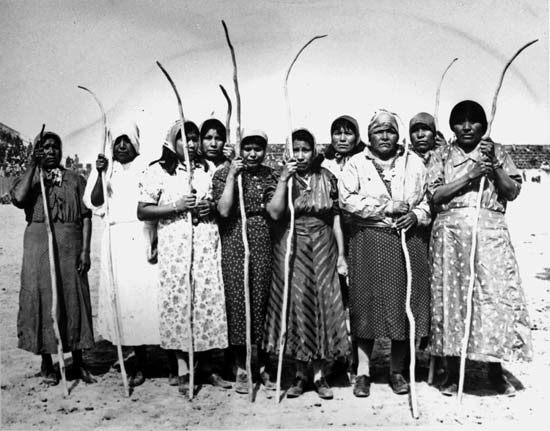Pima
people
 North American Indians who traditionally lived along the Gila and Salt rivers in Arizona, U.S., in what was the core area of the prehistoric Hohokam culture. The Pima, who speak a Uto-Aztecan (Uto-Aztecan languages) language and call themselves the “River People,” are usually considered to be the descendants of the Hohokam. Like their presumed ancestors, the Pima were traditionally sedentary farmers who lived in one-room houses and utilized the rivers for irrigation. Some hunting and gathering were done to supplement the diet, and in drought years, which occurred on the average of one year in five, crop failure made hunting and gathering the sole mode of subsistence. During these dry years jackrabbits and mesquite beans became the group's dietary staples.
North American Indians who traditionally lived along the Gila and Salt rivers in Arizona, U.S., in what was the core area of the prehistoric Hohokam culture. The Pima, who speak a Uto-Aztecan (Uto-Aztecan languages) language and call themselves the “River People,” are usually considered to be the descendants of the Hohokam. Like their presumed ancestors, the Pima were traditionally sedentary farmers who lived in one-room houses and utilized the rivers for irrigation. Some hunting and gathering were done to supplement the diet, and in drought years, which occurred on the average of one year in five, crop failure made hunting and gathering the sole mode of subsistence. During these dry years jackrabbits and mesquite beans became the group's dietary staples.The intensive farming of the Pima made possible larger villages than were feasible for their neighbours and relatives, the Tohono O'odham (Papago). With larger communities came a stronger and more complex political organization. In the early Spanish colonial period the Pima possessed a strong tribal organization, with a tribal chief elected by the chiefs of the various villages. The tribal and local chiefs attained their status through their personal qualities rather than through birth. The village chief, aided by a council of all adult males, had the responsibilities of directing the communal irrigation projects and of protecting the village against alien tribes, notably the Apache. Planting and harvesting crops were handled as a cooperative venture.
From the time of their earliest recorded contacts with European and American colonizers, the Pima have been regarded as a friendly people. During the California Gold Rush (1849–50), the Pima often gave or sold food to emigrant settlers and gold seekers and provided them with an escort through Apache territory. During the Apache wars (1861–86), Pimas served as scouts for the U.S. Army.
In the early 21st century Pima descendants numbered some 11,000.
- Arizona, University of
- Arjan
- Arjuna
- ark
- Arkadelphia
- Arkady Isaakovich Raikin
- Arkady Vorobyev
- Arkansas
- Arkansas City
- Arkansas, flag of
- Arkansas Post
- Arkansas River
- Arkansas River Navigation System
- Arkansas State University
- Arkansas, University of
- Arkatag Mountains
- Arkell, Anthony John
- Arkell, William Joscelyn
- Arkhangelsk
- Arklow
- Ark of the Covenant
- Arkona
- arkose
- ark shell
- Arkwright, Sir Richard